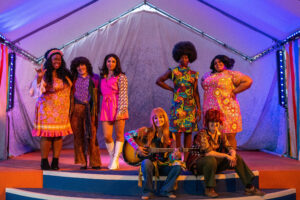About
Posted at TimesofSanDiego.com on 6/14/21
RUN DATES: 6/11/21 – 7/25/21
VENUE: New Village Arts at the Flower Fields
In “Beehive, the ‘60s Musical,” sisters are doin’ it for themselves.
Okay, maybe that’s a 1985 Eurythmics song, but it was also recorded by Aretha Franklin (in ’85), and it perfectly captures the sensibility of the 1980s musical about the 1960s.
The show, featuring 30+ popular tunes, is actually a revue rather than a musical. Lots of songs (thankfully, mostly in their entirety, not sampled or mashed up), but no story, plot or thematic through-line, except for the remarkable evolution of women and song in the seminal decade.
In the new production from New Village Arts —outdoors at the Flower Fields in Carlsbad — there’s an effort to wake up (as in ‘woke’) the proceedings, with additional focus on civil rights, Latinas and lesbians. The additions feel forced, and most of these songs weren’t really about that; in the first part of the decade, they weren’t even about female empowerment.
Interestingly, not all the songs from the original version by Larry Gallagher are included. Others are added, and for the \ finale, instead of Mama Cass’ “Make Your Own Kind of Music,” we get “Respect,” Aretha’s megahit that became a feminist anthem, though it was written and first recorded by a man (Otis Redding).
This is a show that will will probably have the greatest direct appeal to Boomers — and the opening night audience gave head-bobbing, toe-tapping evidence of that.
But for any viewer of any age, it’s striking how dramatically everything changed from the beginning to the end of the decade: not only musically, but also in clothes, hairstyles, political activism and women’s sense of self.
Less of this than one might expect is reflected in the music. The two most blatant expressions of female empowerment are “You Don’t Own Me” (written by two men; made popular by 17 year-old Lesley Gore in 1963) and “Respect,” recorded by Aretha in 1987, two years after Otis Redding introduced it. Even “Me and Bobby McGee” was initially written by a man, Kris Kristofferson, and first sung by Roger Miller in 1969. Janis Joplin’s #1 hit version, recorded a few days before her death, was released posthumously in 1971.
Many of the early-decade, bubble-gum pop tunes were all about the boy (“My Boyfriend’s Back,” “It’s My Party,” “Sweet-Talkin’ Guy”). But later in the ‘60s, women came into their own — as individuals and performers. When Carole King recorded her own song, “Will You Still Love Me Tomorrow” in 1971, critic David Hepworth compared it to the 1960 chart-topping version by The Shirelles as “less like the pleas for gentleness on the part of a trembling virgin and more like a mature woman requiring parity in a relationship.”
It’s the later songs that give the show potence and make the second act of this 90 minute evening more deep and rich.
In other productions I’ve seen, there was a determined effort to replicate, as much as possible, the look and sound of the superstars who first recorded the songs.
But it seems that director Kristianne Kurner, artistic director of New Village Arts, and music director Kyrsten Hafso-Koppman, gave the cast more leeway, allowing (or encouraging) them to use their own vocal power in more personal ways. This has both plus-sides and minuses. On one hand, you long to hear the songs as you know them. But on the other, why not give them a different spin? Some results are more successful than others.
The production’s design elements are enigmatic. Though the set (Kirsten E. Flores) sports the super-bright colors of the era and photos of influential women of the age, the costumes (Faith A. James) and wigs (only ONE actual Beehive hairdo onstage!), do not accurately reflect the times.
Many of the outfits are unflattering, and having lived through the ‘60s, I can rightly say that almost nothing up there looks what anyone I encountered was wearing in those days – onstage or off. No tie-dye, bell-bottoms, hip-huggers, Pop art, dashikis or peace symbols in sight here.
There were repeated problems with the sound (Evan Eason) on opening night, with mics being on-and-off finicky, as often happens in outdoor productions.
The choreographer (Alyssa “Ajay” Junious) was obviously hamstrung by the lack of dance capability in most of the cast. The notable exception is Megan Carmitchel, who served as dance captain and made everything she did look and sound great ( for example, “Be My Baby,” “You Don’t Own Me,” “Son of a Preacher Man”).
Each of the others had at least one prominent moment to shine.
Erin Vanderhyde – “Walkin’ in the Rain”
Bibi Mama – “One Fine Day”
Rae Henderson – “Don’t You Want Somebody to Love”
Brittany Carillo – “Try (Just a Little Bit Harder)”
Natasha Baenisch – “Cry Baby”
Eboni Muse – “Proud Mary,” “Chain of Fools,” “(You Make Me Feel Like) A Natural Woman”
A really exciting part of the production for me was that it was my first post-pandemic live theater experience. Spirits were high and the energy was infectious.
If you’re hungering for theater, and would love to rock out to some good ole ‘60s nostalgia (and some fabulous songs), this just might be the show for you.
©2021 PAT LAUNER/Patté Productions, Inc.





